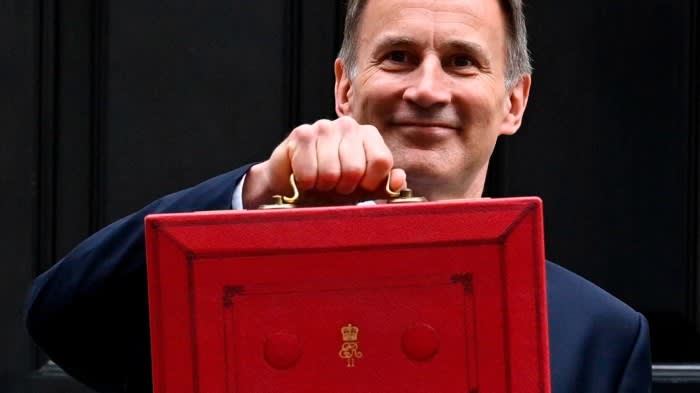Unlock the Editor’s Digest for free
Roula Khalaf, Editor of the FT, selects her favourite stories in this weekly newsletter.
The IMF has warned UK chancellor Jeremy Hunt against cutting taxes, arguing the country needs to curb public borrowing and prioritise spending in areas such as health, education and tackling climate change.
Pierre-Olivier Gourinchas, IMF chief economist, told the Financial Times the UK’s focus should be on “the path towards a fiscal consolidation” despite expectations that Hunt will cut taxes at his spring Budget.
Hunt should be “trying to rebuild fiscal buffers . . . in the context in which there are important spending needs”, Gourinchas said, rather than add to the £20bn of personal and business tax cuts delivered in November.
“We would rather wish they would not do this type of tax cuts, and that they would instead focus on both addressing the spending needs and on the path towards a fiscal consolidation,” Gourinchas added.
The comments came as the IMF predicted the UK economy will expand by a tepid 0.6 per cent in 2024, the second-slowest pace in the G7 after Germany and little better than the 0.5 per cent rate estimated for 2023.
UK GDP growth is forecast to accelerate to 1.6 per cent in 2025, the IMF added in an update on Tuesday to its most recent World Economic Outlook.
Hunt and Prime Minister Rishi Sunak have stoked expectations that the upcoming March 6 Budget will contain a fresh round of tax giveaways to bolster the Conservatives’ polling figures ahead of the general election.
On a visit to Davos, Switzerland, earlier this month, Hunt dropped heavy hints that he wants to cut taxes again at the Budget as he argued that lower-tax economies tended to grow faster.
The IMF said last summer that the Treasury would probably need to lift spending by more in the medium term than it currently expects to preserve “high-quality” public services and invest in the green transition.
As a result, the UK needed to bolster taxation on carbon and on property, while eliminating loopholes in wealth and income taxation, the IMF said at the time in its “Article IV” assessment of the UK economy.
Real-terms spending by UK government departments is currently meant to rise by just 1 per cent a year, according to Treasury plans.
Hunt rejected the IMF’s recommendations on tax policy on Tuesday.
“The IMF expect growth to strengthen over the next few years, supported by our introduction of the biggest capital investment tax reliefs anywhere in the world, alongside national insurance cuts to improve work incentives,” he said.
“It is too early to know whether further reductions in tax will be affordable in the Budget, but we continue to believe that smart tax reductions can make a big difference in boosting growth,” Hunt added.
UK underlying public debt as a share of GDP is forecast by the Office for Budget Responsibility to rise from 89 per cent this year to more than 93 per cent in three years’ time, before edging down in half a decade.
Hunt’s scope for tax cuts will hinge heavily on the remaining “fiscal headroom” that the chancellor has as he tries to meet his self-imposed fiscal rule of ensuring public debt falls as a share of GDP in five years.
Richard Hughes, chair of the OBR — the government’s official fiscal watchdog — has said that the £13bn Budget headroom forecast in Hunt’s Autumn Statement in November is heavily exposed to changing assumptions on interest rates and data revisions.
Internal estimates from the Treasury suggested last week the headroom going into the March Budget may not be far off the November prediction, leaving Hunt with only modest scope to cut taxes and hit his fiscal target.
Gourinchas said it was important that the UK continues its progress towards lower inflation, noting that price growth is coming down faster than expected.
Consumer prices inflation edged up to 4 per cent in December from 3.9 per cent the previous month, but that is well under levels exceeding 10 per cent a year earlier.
The IMF in its report said in many regions around the world inflation has been falling more rapidly than expected, opening the door to a “soft landing” for the global economy in the wake of aggressive central bank interest rate increases.
But it has been counselling against immediate rate cuts given the need to decisively quash inflation.
The Bank of England is widely expected to maintain its policy interest rate at 5.25 per cent on Thursday as it seeks to keep the lid on price growth.
The IMF said it expected the BoE to hold firm in the coming months, before it cuts its official rate by half a point in the second half of this year.
The IMF upgraded its forecasts for global growth this year by 0.2 of a percentage point to 3.1 per cent, and said Russia’s GDP was forecast to rise 2.6 per cent this year, more than double the rate it predicted in October.
